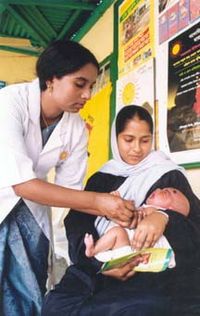
Photo from wikipedia
Most types of dementia, including Alzheimer's disease, are not curable. However, there are risk factors, such as obesity or hypertension, that can promote the development of dementia. Holistic treatment of… Click to show full abstract
Most types of dementia, including Alzheimer's disease, are not curable. However, there are risk factors, such as obesity or hypertension, that can promote the development of dementia. Holistic treatment of these risk factors can prevent the onset of dementia or delay it in its early stages. To support individualized treatment of risk factors in dementia, this paper presents a model-driven digital platform. It enables monitoring of biomarkers using smart devices from the internet of medical things (IoMT) for the target group. The collected data from such devices can be used to optimize and adjust treatment in a patient in the loop manner. To this end, providers such as Google Fit and Withings have been connected to the platform as example data sources. To achieve treatment and monitoring data interoperability with existing medical systems, internationally accepted standards such as FHIR are used. The configuration and control of the personalized treatment processes are achieved using a self-developed domain-specific language. For this language, an associated diagram editor was implemented, which allows the management of the treatment processes through graphical models. This graphical representation should help treatment providers to understand and manage these processes more easily. To investigate this hypothesis, a usability study was conducted with twelve participants. We were able to show that such graphical representations provide advantages in clarity in reviewing the system, but lack in easy set-up (compared to wizard-style systems).
Journal Title: Studies in health technology and informatics
Year Published: 2023
Link to full text (if available)
Share on Social Media: Sign Up to like & get
recommendations!